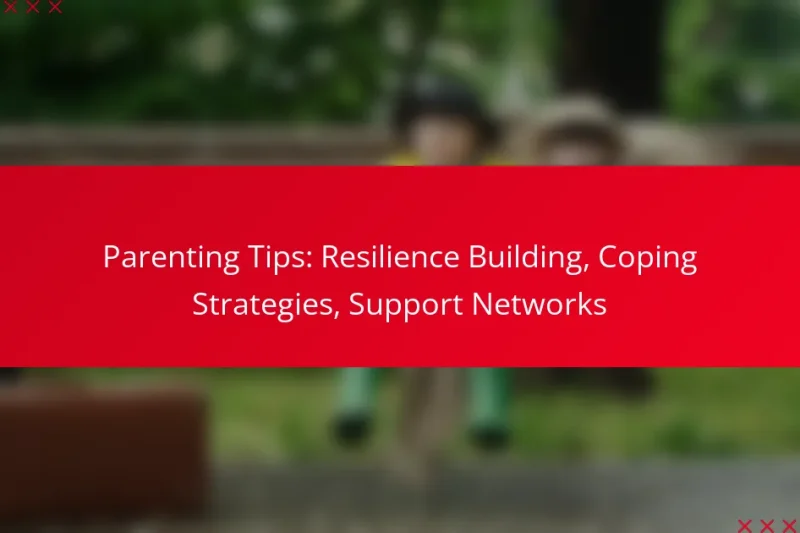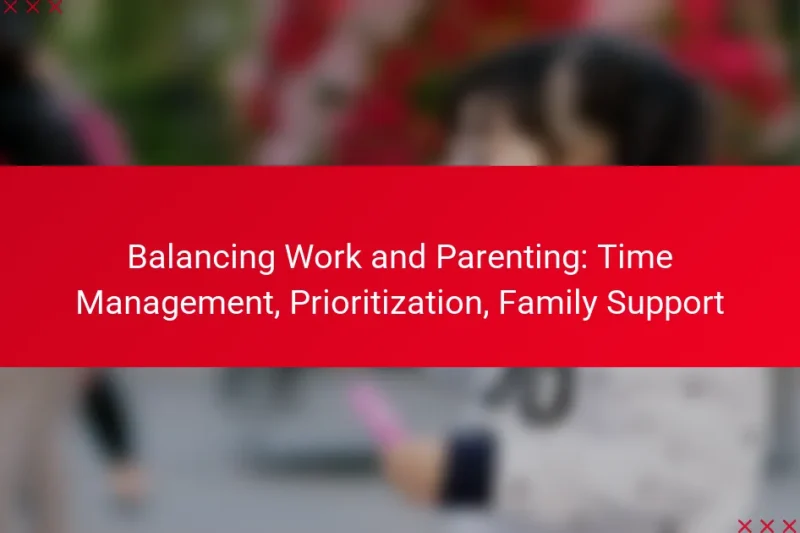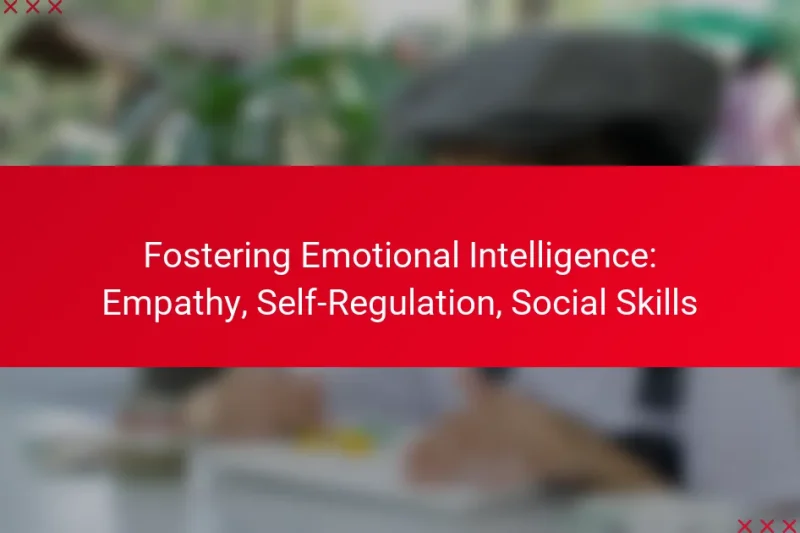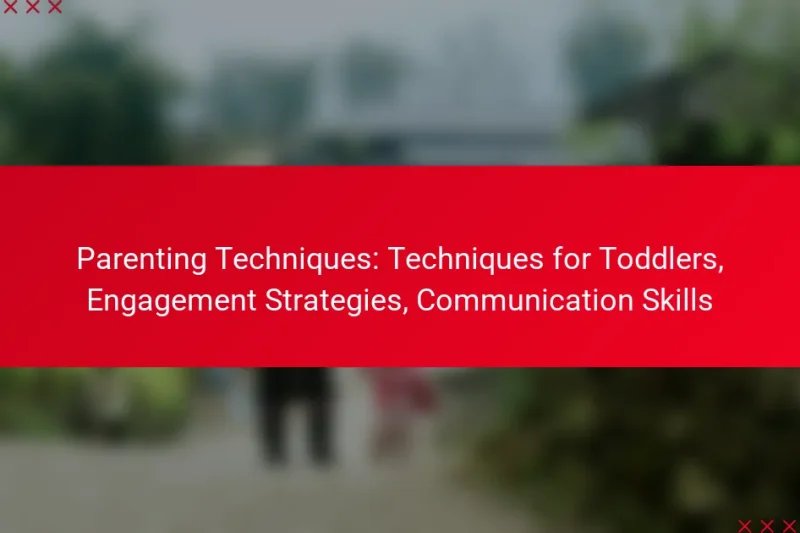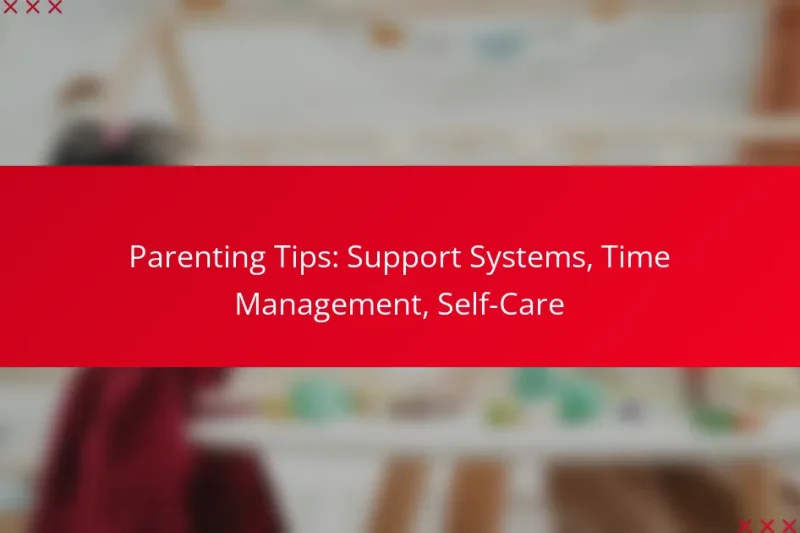Building resilience in children is essential for their emotional well-being and ability to cope with life’s … Parenting Tips: Resilience Building, Coping Strategies, Support NetworksRead more
Effective Parenting Strategies
Effective parenting strategies are essential for nurturing a child’s growth and development. By implementing techniques such as positive reinforcement, consistent routines, and active listening, parents can create a supportive environment that encourages independence and emotional intelligence. Additionally, managing screen time with clear limits and promoting alternative activities helps children develop healthy habits while benefiting from technology.
Balancing Work and Parenting: Time Management, Prioritization, Family Support
Balancing work and parenting requires effective time management and prioritization to ensure that both responsibilities are … Balancing Work and Parenting: Time Management, Prioritization, Family SupportRead more
Strategies for Positive Behavior: Praise, Modeling, Clear Expectations
Implementing effective strategies for promoting positive behavior in educational settings is crucial for fostering a supportive … Strategies for Positive Behavior: Praise, Modeling, Clear ExpectationsRead more
Fostering Emotional Intelligence: Empathy, Self-Regulation, Social Skills
Fostering emotional intelligence is essential for enhancing workplace relationships and promoting collaboration among colleagues. By cultivating … Fostering Emotional Intelligence: Empathy, Self-Regulation, Social SkillsRead more
Parenting Techniques: Techniques for Toddlers, Engagement Strategies, Communication Skills
Parenting toddlers requires effective techniques that nurture positive behavior and enhance communication. By engaging them in … Parenting Techniques: Techniques for Toddlers, Engagement Strategies, Communication SkillsRead more
Parenting Tips: Support Systems, Time Management, Self-Care
Parenting can be both rewarding and challenging, making support systems, time management, and self-care essential for … Parenting Tips: Support Systems, Time Management, Self-CareRead more
Discipline Methods: Positive Reinforcement, Consistency, Natural Consequences
Discipline methods such as positive reinforcement, consistency, and natural consequences play a vital role in shaping … Discipline Methods: Positive Reinforcement, Consistency, Natural ConsequencesRead more
What are effective parenting strategies for toddlers?
Effective parenting strategies for toddlers focus on fostering a nurturing environment that promotes growth and development. These strategies include positive reinforcement, consistent routines, encouraging independence, active listening, and age-appropriate discipline.
Positive reinforcement techniques
Positive reinforcement involves rewarding desirable behaviors to encourage their repetition. This can be done through verbal praise, stickers, or small treats when toddlers exhibit good behavior, such as sharing or following instructions.
To implement this, be specific about what behavior you are praising. For instance, saying “Great job putting your toys away!” reinforces the action and makes it clear what behavior is being rewarded.
Setting consistent routines
Establishing consistent routines helps toddlers feel secure and understand what to expect throughout the day. A predictable schedule for meals, playtime, and bedtime can significantly reduce anxiety and behavioral issues.
Consider using visual schedules with pictures to help your toddler grasp the routine. This can include images for breakfast, storytime, and bedtime, making transitions smoother and more understandable for them.
Encouraging independence
Encouraging independence allows toddlers to develop confidence and self-reliance. Simple tasks, such as dressing themselves or choosing their snacks, can foster a sense of accomplishment.
Provide choices within limits, like asking if they want an apple or a banana for a snack. This empowers them while still guiding their decisions, helping them learn to make choices effectively.
Active listening practices
Active listening involves fully engaging with your toddler when they communicate. This means giving them your full attention, making eye contact, and responding appropriately to their thoughts and feelings.
To practice active listening, repeat back what your toddler says to show understanding, such as “You’re feeling sad because your toy broke.” This validates their emotions and encourages them to express themselves more freely.
Using age-appropriate discipline
Age-appropriate discipline focuses on teaching rather than punishing. For toddlers, this can include redirecting their attention or using time-outs for brief periods to help them understand the consequences of their actions.
Ensure that any disciplinary measures are consistent and explained in simple terms. For example, if a toddler hits, calmly explain that hitting is not acceptable and suggest a better way to express frustration, like using words or asking for help.
How can parents manage screen time for children?
Parents can effectively manage screen time for children by setting clear limits, selecting appropriate content, and promoting alternative activities. This balanced approach helps children develop healthy habits while enjoying the benefits of technology.
Establishing screen time limits
Setting screen time limits is crucial for maintaining a healthy balance between digital and real-world interactions. Experts recommend that children aged 2 to 5 should have no more than one hour of high-quality programming each day, while older children should have consistent limits based on their age and responsibilities.
To implement these limits, consider using tools like timers or apps that track usage. Regularly review and adjust these limits as needed, ensuring they align with your family’s values and lifestyle.
Choosing educational content
Selecting educational content is essential for maximizing the benefits of screen time. Look for programs and apps that promote learning and critical thinking, such as interactive games or documentaries that align with your child’s interests and educational goals.
Resources like Common Sense Media can help parents evaluate the quality of content. Aim for a mix of entertainment and education to keep children engaged while fostering their development.
Encouraging outdoor activities
Encouraging outdoor activities is a vital part of managing screen time. Aim to have children participate in physical activities for at least one hour each day, which can include sports, hiking, or simply playing outside with friends.
To make outdoor time appealing, plan family outings or set up playdates that involve active games. This not only reduces screen time but also promotes physical health and social skills.
Modeling healthy screen habits
Parents should model healthy screen habits to reinforce the importance of balanced usage. Demonstrate appropriate screen time by limiting your own device use during family time and engaging in activities that do not involve screens.
Discuss your screen time choices with your children, explaining why moderation is important. This approach helps children understand the value of balance and encourages them to adopt similar habits.
What are the benefits of positive parenting?
Positive parenting fosters a nurturing environment that promotes healthy development in children. This approach leads to numerous benefits, including improved behavior, stronger relationships, and enhanced emotional intelligence.
Improved child behavior
Positive parenting techniques, such as praise and encouragement, can significantly enhance child behavior. By focusing on reinforcing good actions rather than punishing bad ones, children learn to make better choices. For instance, acknowledging a child’s effort in completing homework can motivate them to continue working hard.
Establishing clear expectations and consistent consequences also plays a crucial role. When children understand the rules and the reasons behind them, they are more likely to adhere to them. This clarity helps reduce confusion and frustration for both parents and children.
Stronger parent-child relationships
Positive parenting strengthens the bond between parents and children through open communication and trust. When parents actively listen and validate their children’s feelings, it fosters a sense of security and belonging. This connection encourages children to share their thoughts and concerns more freely.
Spending quality time together, such as engaging in family activities or simply having regular conversations, can deepen this relationship. Consistent involvement in a child’s life shows that parents care, which reinforces mutual respect and understanding.
Enhanced emotional intelligence
Positive parenting helps children develop emotional intelligence by teaching them to recognize and manage their feelings. Parents can model emotional regulation by demonstrating how to cope with stress or disappointment in healthy ways. For example, discussing feelings during a calm moment can prepare children to handle difficult emotions when they arise.
Encouraging empathy is another vital aspect. Parents can guide children to consider others’ perspectives, which enhances their ability to connect with peers. Activities like volunteering or discussing social situations can provide practical opportunities for children to practice empathy and compassion.
How to handle teenage rebellion effectively?
To handle teenage rebellion effectively, focus on building trust and maintaining open lines of communication. Understanding your teen’s perspective and balancing guidance with independence can lead to more constructive interactions.
Open communication strategies
Open communication is crucial for navigating teenage rebellion. Encourage your teen to express their thoughts and feelings without fear of judgment. Regular family meetings or casual check-ins can foster a safe environment for dialogue.
Use active listening techniques, such as summarizing what your teen says and asking clarifying questions. This shows that you value their opinions and helps to build mutual respect.
Setting clear boundaries
Establishing clear boundaries is essential in managing rebellious behavior. Clearly outline expectations regarding curfews, academic performance, and social activities. Consistency in enforcing these boundaries helps teens understand the limits while still feeling secure.
Involve your teen in the boundary-setting process to encourage ownership and accountability. Discuss the reasons behind each rule and be open to negotiating certain aspects, which can promote a sense of fairness.
Understanding adolescent development
Understanding adolescent development is key to addressing rebellion. Recognize that this stage involves a quest for identity and independence, which can manifest as defiance. Familiarize yourself with common developmental milestones to better empathize with your teen’s behavior.
Be aware of the emotional and social changes your teen is experiencing. Providing support and guidance during this transitional phase can help them navigate challenges more effectively, reducing the likelihood of rebellion.
What are the key elements of effective discipline?
Effective discipline involves guiding children towards appropriate behavior through clear expectations and consistent practices. Key elements include consistency in rules, the use of natural consequences, and time-out techniques.
Consistency in rules
Consistency in rules means applying the same standards across different situations and times. This helps children understand what is expected of them and reduces confusion. For example, if a child is not allowed to use their phone during dinner, this rule should be enforced every time.
To maintain consistency, parents can create a simple chart outlining rules and consequences. Regularly reviewing these rules with children can reinforce their understanding and adherence.
Natural consequences
Natural consequences occur when children experience the direct results of their actions, promoting learning through real-life experiences. For instance, if a child refuses to wear a coat on a chilly day, they will feel cold, which teaches them the importance of dressing appropriately.
While using natural consequences, ensure they are safe and appropriate for the child’s age. Avoid scenarios where the child could face harm or serious distress, as these can lead to negative associations with learning.
Time-out techniques
Time-out techniques involve temporarily removing a child from a situation to help them calm down and reflect on their behavior. This method can be effective when a child is overly emotional or acting out. A typical duration for a time-out is one minute for each year of the child’s age.
To implement time-outs effectively, designate a specific area for this purpose, ensuring it is free from distractions. After the time-out, discuss the behavior with the child to reinforce understanding and encourage better choices in the future.
How can parents support their child’s education?
Parents can support their child’s education by fostering a positive learning environment and engaging actively in their academic journey. This includes helping with homework, encouraging reading, and maintaining open communication with teachers.
Creating a Positive Learning Environment
A positive learning environment is crucial for a child’s educational success. This can be achieved by establishing a dedicated study space free from distractions, ensuring adequate lighting, and providing necessary supplies. Parents should also set a consistent schedule for homework and study time to help children develop good habits.
Encouragement and praise play a significant role in maintaining motivation. Recognizing effort and celebrating achievements, no matter how small, can boost a child’s confidence and interest in learning.
Engaging with Teachers and Schools
Active engagement with teachers and schools can greatly enhance a child’s educational experience. Parents should attend parent-teacher meetings, communicate regularly with educators, and participate in school events. This involvement helps parents stay informed about their child’s progress and any challenges they may face.
Building a relationship with teachers allows parents to understand the curriculum better and how they can support their child’s learning at home. It also opens up channels for discussing any concerns or seeking additional resources.
Encouraging Reading and Learning at Home
Encouraging reading is one of the most effective ways to support a child’s education. Parents should provide access to a variety of books and reading materials that match their child’s interests and reading level. Setting aside time for family reading can make this a shared activity, fostering a love for literature.
Incorporating educational games and activities into daily routines can also enhance learning. Simple math games, science experiments, or educational apps can make learning fun and engaging, reinforcing concepts taught in school.
